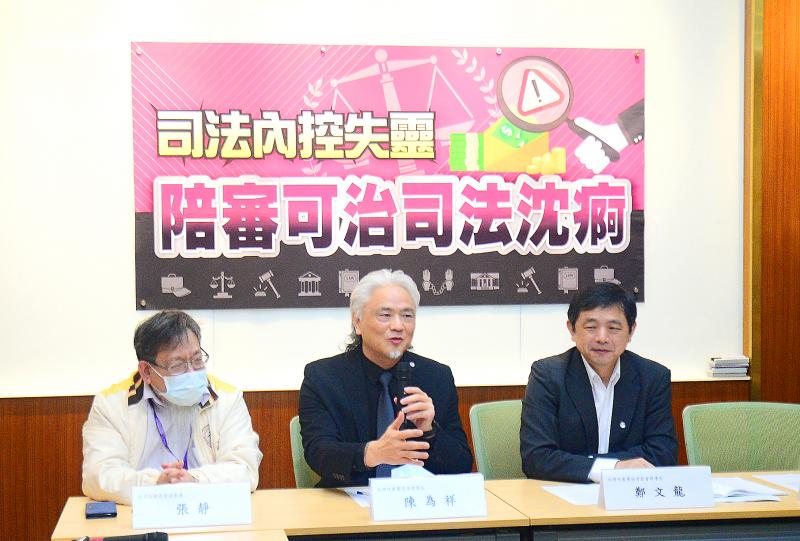Judicial reform advocates yesterday called for the implementation of a jury system for criminal cases and the end of life-long tenures for judges, changes they said are needed to restore trust in the judicial system.
The call follows a Judicial Yuan report released on Monday detailing the alleged involvement of judicial officials in a corruption case centered on former Supreme Court judge Shih Mu-chin (石木欽) and Chia Her Industrial Co (佳和集團) president Weng Mao-chung (翁茂鍾).
Legal experts and media reports have called the case “the biggest corruption scandal in the history of Taiwan’s judiciary,” due to allegations of widespread bribe-taking, abuse of authority, conflict of interest and other alleged illicit activities by more than 200 judicial and government officials, including judges, prosecutors, investigators, military and police officials, and some political figures, to whom Shih reportedly introduced Weng.

Photo: Wang Yi-sung, Taipei Times
Taiwan Jury Association members said the report had shown that control mechanisms at the Judicial Yuan and Ministry of Justice have broken down.
A more comprehensive probe into the matter is needed to root out corruption, association director Chen Wei-shyang (陳為祥) told a news conference in Taipei.
“Another serious problem is controlling materials and court files pertaining to the scandal, which are in the possession of the justice system,” Chen said, adding that the ministry only made a portion of the files available to Control Yuan members to conduct a probe.
Association founder Jerry Cheng (鄭文龍) said the report shows that judges believe “they are above the law; that they can manipulate and play with the law.”
Cheng said the case highlights the problem in giving judges life-long tenure.
“The system allows these corrupt judges to take bribes, be bought off and still keep their jobs,” he said. “Taxpayers have to provide the salary and pension for these corrupt judges for life. This goes against reason.”
“Life-long tenure for judges must be changed. It is not possible to determine whether a person has moral principles and good ethics just by passing an examination to become a judge. Limited terms are needed, and some posts should be filled with attorneys and prosecutors who have shown good conduct and that they are not tainted by unscrupulous behavior,” Cheng said.
Attorney Chang Ching (張靜), who previously worked as a judge and prosecutor, said that he hoped the ministry and Judicial Yuan would take this opportunity to reflect on themselves “and make real changes” to fix problems revealed in the case.
“If they do not, Taiwanese will no longer have faith in the justice system, nor will they expect to have true judicial reform,” Chang said.
Control Yuan member Wang Mei-yu (王美玉), in presenting the report, said that “this case has severely damaged our nation’s justice system, its reputation to carry out justice based on the principles of equality and fairness for all people, and eroded the public’s trust in the government.”
Following criticism of shortcomings and deficiencies in reports on the case, Judicial Yuan President Hsu Tzong-li (許宗力) said he would launch a comprehensive investigation that would name all the judges found to have engaged in improper conduct with Weng.
Minister of Justice Tsai Ching-hsiang (蔡清祥) said that the ministry would root out all officials found to have been involved in the case, would submit materials and documents from the ministry’s Investigation Bureau, and seek to clarify aspects of the report that lack details.

Alain Robert, known as the "French Spider-Man," praised Alex Honnold as exceptionally well-prepared after the US climber completed a free solo ascent of Taipei 101 yesterday. Robert said Honnold's ascent of the 508m-tall skyscraper in just more than one-and-a-half hours without using safety ropes or equipment was a remarkable achievement. "This is my life," he said in an interview conducted in French, adding that he liked the feeling of being "on the edge of danger." The 63-year-old Frenchman climbed Taipei 101 using ropes in December 2004, taking about four hours to reach the top. On a one-to-10 scale of difficulty, Robert said Taipei 101

Nipah virus infection is to be officially listed as a category 5 notifiable infectious disease in Taiwan in March, while clinical treatment guidelines are being formulated, the Centers for Disease Control (CDC) said yesterday. With Nipah infections being reported in other countries and considering its relatively high fatality rate, the centers on Jan. 16 announced that it would be listed as a notifiable infectious disease to bolster the nation’s systematic early warning system and increase public awareness, the CDC said. Bangladesh reported four fatal cases last year in separate districts, with three linked to raw date palm sap consumption, CDC Epidemic Intelligence

US climber Alex Honnold left Taiwan this morning a day after completing a free-solo ascent of Taipei 101, a feat that drew cheers from onlookers and gained widespread international attention. Honnold yesterday scaled the 101-story skyscraper without a rope or safety harness. The climb — the highest urban free-solo ascent ever attempted — took just more than 90 minutes and was streamed live on Netflix. It was covered by major international news outlets including CNN, the New York Times, the Guardian and the Wall Street Journal. As Honnold prepared to leave Taiwan today, he attracted a crowd when he and his wife, Sanni,

Taiwanese and US defense groups are collaborating to introduce deployable, semi-autonomous manufacturing systems for drones and components in a boost to the nation’s supply chain resilience. Taiwan’s G-Tech Optroelectronics Corp subsidiary GTOC and the US’ Aerkomm Inc on Friday announced an agreement with fellow US-based Firestorm Lab to adopt the latter’s xCell, a technology featuring 3D printers fitted in 6.1m container units. The systems enable aerial platforms and parts to be produced in high volumes from dispersed nodes capable of rapid redeployment, to minimize the risk of enemy strikes and to meet field requirements, they said. Firestorm chief technology officer Ian Muceus said